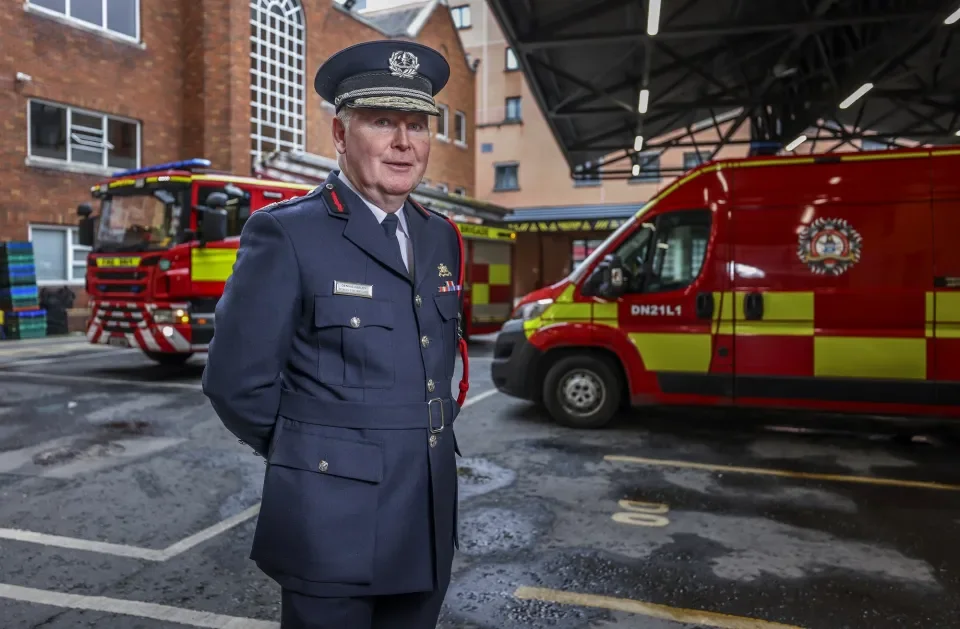

On the frontline
Dublin’s Chief Fire Officer Dennis Keeley reflects on how returning to DCU for a master’s enhanced his leadership skills for one of the most demanding emergency service roles in the city.
Interview: Mícheál Ó Scannáil
Dennis Keeley’s journey to becoming Dublin’s Chief Fire Officer began more by accident than design. He started his working career as an apprentice technician and says he was “working alone and wasn’t particularly enjoying that when I met a retired firefighter – he suggested I consider becoming a firefighter and working as part of a team.
I joined Dublin Fire Brigade in 1986 as a recruit and here I am all these years later, Chief Fire Officer of Dublin Fire Brigade.” His role involves the overall leadership, management, and strategic development of both the fire and ambulance services.
Managing a staff of over 1,000 people and a €160m budget, he is responsible for protecting communities, businesses and infrastructure in an area with a population of 1.5 million people. He says graduating from DCU in 2009 with a Master’s in Emergency Management, enhanced his capacity for the job.
“The course was a great opportunity for me to gain a much stronger theoretical understanding of Emergency Management and the concepts and knowledge around it that I certainly previously wouldn’t have engaged in. And that course also helped my communication skills and critical thinking.
“There would be a fair amount of what I I’d like to think is controlled pressure in the job,” he says, “and I think the trick is to have a strong team and a team you have very clear direction on where we’re going, and I’d like to think that that’s the case.”
His brief now involves ensuring emergency responders are provided with up-to-date training, and ensuring equipment and systems are as fit as possible for purpose. His own experience as a firefighter means he understands the importance of attention to detail in a dangerous job.
“It’s a dangerous job in that you’re in an environment that, as much as you try to ensure that you have control over it, you never can be absolutely confident you’re totally in control,” he says. “There’s always an element of risk because our workplace varies each time we arrive. In many ways, that sets us aside from other industries. “There are times when I have been anxious, afraid, concerned, but I think there’s a very strong culture and ethos of teamwork, so when those emotions are rising up you can turn to your left or right and find supportive colleagues.”

“We are trying now to harness technology to assist the incident command system and to allow a range of complex incidents to be examined and explored through the use of technology-assisted simulation. We learn lessons from everything.”
Dublin Chief Fire Officer, Dennis Keeley (Master in Emergency Management, 2009). Photo: Kyran O’Brien
From the uniform to the fire engine, much has changed since Keeley joined the fire service as a recruit in the 1980s. The newest innovation is Augmented Reality training. “We are trying now to harness technology to assist the incident command system and to allow a range of complex incidents to be examined and explored through the use of technology-assisted simulation,” he says. In the past, such simulations would either not have been possible or would have required “huge labour-intensive requirements.”
He adds: “We will be looking at developing further augmented intelligence training modules to help keep our officers safe and to help expose officers to challenging scenarios in a safe environment and prepare them as much as one possibly can.” In his career, Keely has made countless rescues and saved many lives, but there is one night he will never forget. On Saturday, October 10, 2015, a blaze swept through a Traveller halting site in Carrickmines, south Dublin, killing 10 people – five adults and five children, including a five-month-old baby.
“That’s the one that really resonates with me the most,” he says, “and it’s certainly a night I will never forget. On that particular night I was on call. There was chaos, a huge amount of upset and anxiety – a very difficult environment. My own feeling was a sense of such tragedy, such horrific sadness, and a certain level of helplessness because, there was nothing the crews could have done.
“To witness the scenes at the time and the loss and the upset and just absolute indescribable sadness and being so helpless when people are looking to you…because that’s who we are, and people look to you to save the day and at that stage there was nothing we could have done to save those people.
“We reflect on a tragedy like that in terms of the outcomes and what we could have done differently. We learn lessons from everything. But I think it’s one of those incidents where there was nothing more we could have done.” Keeley says that while the Carrickmines tragedy will always remain with him, it increased his passion for improving fire safety.
“Fatalities have dropped. One can’t be complacent, but numbers are down year on year, and one hopes that the fire safety message from Dublin Fire Brigade and other fire authorities is reaping the rewards now.”
Mícheál Ó Scannáil is an RTÉ reporter and presenter.
